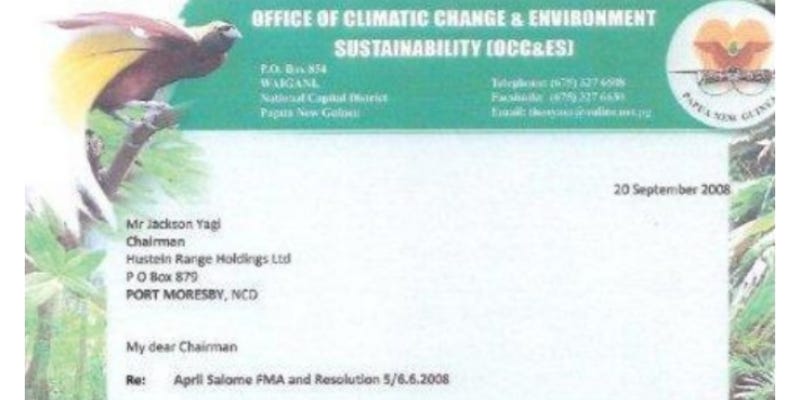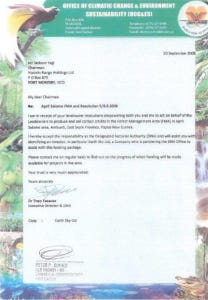On 4 June 2009, Reuters reported evidence of a multi-million offer from carbon brokers to PNG’s Office of Climate Change and Environmental Sustainability. Reuters also reported on sale of carbon credits from an area of forest in PNG that has not been validated.
REDD-Monitor has found (on the internet) some of the documents that Reuters has seen and is sharing these documents, in the interest of transparency.
12 June 2008: Theo Yasause, executive director of OCCES, signed a government memo asking PNG Prime Minister Michael Somare to counter-sign a certificate allowing two carbon brokers, Earth Sky and Climate Assist PNG, to sell US$500 million worth of forest carbon offsets. “The (two brokers are) prepared to put in 10 million Australian Dollars [US$8 million] to assist the establishment of the Office of Climate Change,” Yasause wrote in the memo. In addition, OCCES would earn 20% of any proceeds from carbon sales.
It is far from clear what the US$8 million was actually for, but it’s difficult to avoid the suspicion that this was little more than a bribe. Reuters reports Yasause as saying “Initially we thought we should get some of that. It wasn’t meant to set it as a policy. When I started I thought (it) could come as a tax to government. It was only a proposal. Nothing came through.”
20 September 2008: Yasause wrote to Jackson Yagi, the chairman of Hustein Range Holdings Ltd., an organisation representing local land holders. In the letter, Yasause confirms that he received a “landowner resolution empowering both you and me to act on behalf of the Landowners to produce and sell carbon credits in the Forest Management Area (FMA) in April Salome area, Ambunti, East Sepik Province, Papua New Guinea.” The “landowner agreement” is dated 5/6 June 2008.
Yasause adds he accepts the responsibility as Designated National Authority “and will assist you with finding an investor, in particular Earth Sky Ltd, a Company who is partnering the DNA Office to assist with this funding package.”
17 October 2008: the Office of Climate Change released a Public Notice announcing that “It has come to this office’s knowledge that certain NGO’s are organizing seminars, workshops in discussing Draft Payment System for environmental services including payments for Reducing Emissions from Deforestation and Degradation (REDD).” The Public Notice comments that “It appears that there are endless groups of NGO’s and Carbon Traders coming to PNG with ideas on REDD and proposal for benefit sharing. This dynamic is not constructive for either the government or rural communities.”
The Public Notice states that “Any matter regarding Climate Change and Carbon Trading is ONLY to be dealt with by the Head Office in Port Moresby with the authority of the Executive Director,” and that “All Brokers and Facilitators will first get registered with the Office to facilitate their involvement.”
It ends with warning: “Imposters beware if caught you will be prosecuted.” Given that Earth Sky and Climate Assist PNG seem to be offering US$8 million as part of the registering process with the Office of Climate Change, it is perhaps understandable that the Office wants other carbon brokers to register.
4 November 2008: Theo Yasause signed a Letter of Approval for “April Salome Sustainable Forest Management Project”. The letter states that “Papua New Guinea considers that the April Salome Project being an ‘avoided deforestation project’ is not contemplated as an activity of agreement under CDM as considered in Article 12 of the Kyoto Protocol the Marrakech Accords including the relevant rules, decisions, guidelines, methods and procedures.”
Instead, Papua New Guinea “recognizes and supports the April Salome Project as a Voluntary Emissions Reduction project (VER) and confirms that it meets the Sustainable Development Objectives of Papua New Guinea. It is a project undertaken voluntarily. The project is not a consequence of regulation and undertaking the project is not a legal requirement.”
The letter concludes by stating that “With this Approval Letter, I agree on behalf of Papua New Guinea that the ‘April Salome Sustainable Forest Management Project’ being an avoided deforestation project contemplates the activity of a Voluntary Market Carbon Project.”
18 November 2008: Michael Somare, the Prime Minister of PNG, wrote to Theo Yasause. The letter refers to a series of meetings with Hustein Range Landowners and Chairman and Director of April Salome Forest Management Area. “Mindful of my leadership role since 2002 under the UNFCCC process,” he writes, “with the Coalition of Rainforest Nations as the Co-Chair along with Costa Rica and the need to undertake a pilot project for Reducing Emissions from Deforestation and Degradation using environmental eco-system services, I am directing you to look for responsible entities to assist with the release of payments for environmental eco-services in order that we can retain oru carbon stocks in pursuit of our national development objectives.”
He concludes with a request: “I would appreciate your support for the April Salome FMA project to be a pilot project for environmental eco-services.”
According to what Yasause told Reuters, in January 2009 the Office of Climate Change suspended “all plans to sell rights to the carbon stored in its rainforests after deals sparked land ownership disputes.”
A Switzerland-based carbon broker called South Pole Carbon Asset Management Ltd is selling carbon credits from the April Salome Sustainable Forest Management Project. One of the organisations that has bought carbon credits from South Pole Carbon is a Spanish organisations called CeroCO2. Reuters reported that CeroCO2’s website listed the offsets as meeting a standard devised by the Climate, Community & Biodiversity Alliance (CCBA). But Joanna Durbin, a director at the CCBA, told Reuters, “We have not received any documents about this project.”
After speaking to Reuters, CeroCO2 removed the project from its website. “It was a mistake in our Web site,” the CeroCO2 spokeswoman told Reuters. “We are human.”
South Pole Carbon Asset Management, it seems, has no such qualms. Under the heading “Sales Portfolio: Discover our wide range of voluntary and GS CDM projects available for sale today!” a table on the company’s website lists a Papua New Guinea “avoided deforestation” project with the letters CCBS under the heading “standard”.
Clicking on the map above opens up a two page brochure which states that CCBA is the “Foreseen Standard” for the April Salome project. A second report is also available on South Pole Carbon Asset Management’s website, dated 30 December 2008. The report is titled “Project Design Document April Salome Sustainable Forest Management”. It has the following to say about a company called Earthsky Ltd:
Earthsky Ltd has initiated and managed the avoided deforestation project in Papua New Guinea. The Company personal also has experience in the management of CDM projects, of which a series will be implemented in the course of the next years. EarthSky Ltd. entered into a strategic cooperation with the PNG Office of Climate Change and Carbon Trade to support this REDD project implementation and related activities including carbon monitoring and sustainable development monitoring. EarthSky Ltd. focuses on fostering reforestation, renewable energy and energy efficiency projects with a high sustainable development impact. Projects supported will all be owned by local actors and not by foreign companies.
The report lists two project participants: the project owner is Earthsky Limited (represented by Sean Lewis, with an address in the British Virgin Islands) and the carbon asset manager is South Pole Carbon Asset Management Ltd. The report is clearly at a draft stage. One version of the report (there are three versions available on South Pole Carbon Asset Management’s website) includes several statements highlighted in yellow, such as the following: “We need to find documented evidence that plantation forestry is more expensive (in therms [sic] of profit or IRR per log) than primary forest logging. I am sure it is.”
Even more revealing, particularly since credits have already been sold from this project are the following statements. Under section 3, “GHG Emission Reductions”, the report states that “This section can largely only be completed with the outcome report from the field trip of PNG University.” A little later, the report states that “Two stakeholder consultations must be held during the project cycle in order to fulfil the criteria of the Climate, Community & Biodiversity Standard (CCBS) and Voluntary Carbon Standard (VCS).”
It appears that South Pole Carbon hopes that the carbon credit project can be back-dated to 1996, when the PNG government intervened to stop logging in the April Salome area. The report states that “The project will facilitate local communities to participate in spatial planning and the development of district and land use plans.” This is followed by a comment, highlighted in yellow: “This was required before project start – find out how decision making process was done in 1996.”
The report confirms Theo Yasause’s close involvement in the project:
The local landowners are represented through Hunstein range Holdings Ltd. Hunstein Range Holdings signed an agreement with the Office for Climate and Carbon Trade of PNG, requesting them for support in the commercialization and confirming that “the above company (is) acting on the behalf of the Land Owners of the April Salome Forest Management Area in Hunstein Range, East Sepik Province, PNG. They appointed Dr. Theo Yasaue [sic], Executive Director of the Office of Climate Change and Carbon Trade, to “produce and sell carbon credits” on their behalf. Theo Yasaue [sic] then teamed up with Earthsky Ltd. for the commercialization of the carbon credits and especially the development of the documentation needed, especially the baseline study, PDD, and relevant annexes. A letter to the Office to the Prime Minister confirming the cooperation and is available, additional to a letter back to Hunstein Range Holdings confirming that the office will push forward the VER commercialization.
As The Economist points out in an article about forest carbon credits in PNG, “no government is able to issue any legal REDD credit, as no framework exists for doing so. Indeed, even if REDD is formalised later this year, some expect that credits would be issued by third parties not governments. Nonetheless, the government of Papua New Guinea has apparently been issuing credits.” The Economist’s investigation suggests that at least 40 REDD “credits”, each denoting one million tonnes of carbon have been issued by the Office of Climate Change.
The Economist concludes that “the challenges ahead for REDD are tough ones” and that “without proper care REDD could become a recipe for disaster”:
Kevin Conrad, interviewed last week, said it was too early to conclude what went wrong but said an “independent review” was under way. He added that “carbon speculators” were putting pressures on landowners in many countries to sell large tracts of forest ahead of a possible deal on avoided deforestation in Copenhagen later this year.
The broader issue with any kind of carbon credit, however, is ensuring that governments of poor countries behave impeccably. Indeed, if problems like this can happen in Mr Conrad’s own back yard, it suggests that the challenges ahead for REDD are tough ones.
Avoided deforestation is a big deal for climate-change policy. It is also a prize worth fighting for, even if it is hard to achieve. Poor governance, on top of poorly defined and defended forest property rights, mean that without proper care REDD could become a recipe for disaster rather than part of a solution the world needs.










Comments following the original post on REDD-Monitor.org are archived here: https://archive.ph/lYPEj#selection-1209.1-1209.12